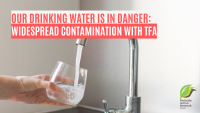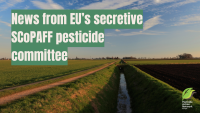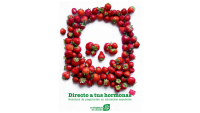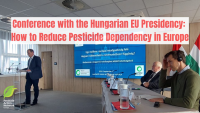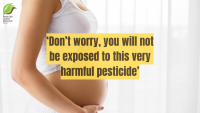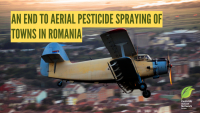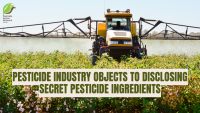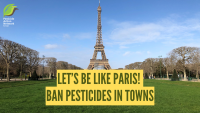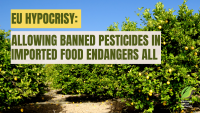Blog
Our drinking water is in danger: widespread contamination with TFA
Our drinking water is in danger. Everywhere in Europe, TFA is found in surface and drinking water. Alarmed by our reports, the Belgian region of Wallonia asked the Water Distribution Company to monitor water for this small PFAS.
News from EU’s secretive SCoPAFF pesticide committee
Important decisions in relation to some toxic pesticides were taken in the recent meeting of the EU pesticide committee SCoPAFF, behind closed doors. Two PFAS pesticides will be banned, but only because the manufacturers retracted the application.
Straight to your hormones: 59 endocrine-disrupting pesticides detected in Spanish food
According to the study “Straight to Your Hormones” by our member, Ecologistas en Acción, food sold in Spain in 2022, both imported and state-produced, had residues of 106 pesticides.
Conference with the Hungarian EU Presidency: How to Reduce Pesticide Dependency in Europe
On September 17, 2024, Friends of the Earth Hungary in collaboration with PAN Europe, Hand Alliance, and Friends of the Earth Europe organised a conference titled “A Path Towards Resilient EU Agriculture - How to Reduce Pesticide Dependency” in Budapest, hosted by the O
Conference calls for better protection of citizens health and biodiversity against pesticides
During a recent conference in the European Parliament a variety of speakers displayed the ongoing health and environmental threats posed by pesticide use.
'Don’t worry, you will not be exposed to this very harmful pesticide'
The European Commission is using a dangerous concept to renew the authorisation of a very harmful pesticide that can damage the unborn child. For the very first time, it plans to use an exceptional clause of the Regulation called ‘negligible exposure’.
An end to aerial pesticide spraying of towns in Romania
Timișoara is a famous Romanian town. This is where the 1989 revolution started that ended the Ceauceșcu dictatorship. Recently, the town made headlines again, less favourable this time.
Pesticide industry objects to disclosing secret pesticide ingredients
Is the Dutch pesticide authority CTGB allowed to disclose information on secret pesticide co-formulants to PAN Europe? That is the gist of the hearing taking place today in the Netherlands as a result of our Access to Document request.
Let’s be like Paris: ban pesticides in towns
During the Olympics, the world saw how the capital city of France still looked nice and clean. It was not overgrown by weeds in the 7 years the city has not used pesticides.
EU Hypocrisy: allowing banned pesticides in imported food endangers all
In a deeply concerning move, the European Commission plans to allow residues of three highly toxic pesticides in certain imported food. The substances are banned in the EU due to their severe health risk.
